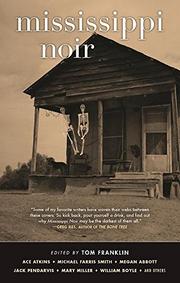 This past week, Akashic Books released another anthology in their award-winning series that began in 2004 with Brooklyn Noir and that has since included Boston Noir, Miami Noir, New Orleans Noir, and many others. According to the publisher, "Each book comprises all new stories, each one set in a distinct location within the region of the book." This one, Mississippi Noir, contains (insert drumroll, here) one of my stories.
This past week, Akashic Books released another anthology in their award-winning series that began in 2004 with Brooklyn Noir and that has since included Boston Noir, Miami Noir, New Orleans Noir, and many others. According to the publisher, "Each book comprises all new stories, each one set in a distinct location within the region of the book." This one, Mississippi Noir, contains (insert drumroll, here) one of my stories.Tom Franklin, the editor of this anthology, did an outstanding job of putting the book together. For those of you who don't know him, Tom--who was a Guest of Honor at last year's Bouchercon--is a great guy, an excellent writer, and a teacher in the MFA program at the University of Mississippi. I first heard of him when his short story "Poachers" won an Edgar Award in 1999 and then appeared in that year's Best American Mystery Stories. Since that time, he's had five books published: Poachers (a collection containing the title story); Smonk; Hell at the Breech; Crooked Letter, Crooked Letter; and The Tilted World. He and his wife Beth Ann Fennelly, also an author and also an MFA teacher at Ole Miss, co-wrote the latest novel.
The anthology, which had its launch signing this past Thursday at Square Books in Oxford, Mississippi, features stories by sixteen writers, including Ace Atkins, Megan Abbott, William Boyle, Michael Kardos, Mary Miller, and Michael Farris Smith. Here's a link to it on Amazon.
NOTE: Also released this week was St. Louis Noir, which contains a story ("Deserted Cities of the Heart") by my friend and fellow SleuthSayer Paul D. Marks.
A pit stop in kudzu country
My story in Mississippi Noir is a bit different from the others. For one thing, it's the longest story in the book--10,000 words and 33 pages; also, it's a little more . . . optimistic, let's say, than some of the other stories. Kirkus Reviews, which spent awhile discussing the despair and poverty and heartache that accompany most of these tales, said, "And every now and again, there's a lucky soul who does manage to triumph over the trouble she gets herself into, like Anna in John M. Floyd's 'Pit Stop.'" Whether that's a good thing, in a book of noir fiction, is another matter--I'll leave that to the reader to decide. But I liked the story, and had great fun writing it. (Not that it matters, I guess, but I liked all the other stories too--and as always, it was fun to meet the other authors, at the launch on Thursday.)
A quick word about my story: Its original title was "Route 25," because the entire piece is set in a section of that highway, between Jackson and the town of Starkville, some 120 miles to the northeast. Later, though, after it was accepted for inclusion in the book, I was told that since each story would reflect a different region, and since State Highway 25 would be listed in the Table of Contents as the area where my story takes place, I was asked if I could come up with another title for the story itself. I decided on "Pit Stop" because it has a double meaning: most of the action takes place near a gas-station/convenience-store on the road trip that the main characters take, and the plot also involves an abandoned well. And yes, somebody winds up in the well. I don't think that's revealing too much; according to Anton Chekhov, "If you show the reader a gun in Act 1, it better go off in Act 3."
A good story is hard to find
My inspiration for this tale, by the way, came from the opening paragraph of one of my favorite shorts, "A Good Man Is Hard to Find," by Flannery O'Connor. That opening features a man from Atlanta proposing a family road trip to his mother, who tells him they shouldn't be traveling in that direction (Florida) because of a killer that the newspaper says is on the loose there. Immediately after finishing that paragraph, any savvy reader knows that before the end of the story those poor vacationers will almost certainly meet up with the killer. I think it's a great example of the art of foreshadowing. Or maybe of setting expectations.
I try to do the same kind of thing in this story. Here's the situation, in "Pit Stop": a young lady and her date are headed out on a two-hour drive to a college football game, after which they plan to stop and hike awhile in the autumn countryside. They already know that the section of highway they'll be traveling is the site of several recent killings, and that whoever committed the murders is still at large--but they're young and they're invincible, right? Well, as you might imagine, they meet some unexpected folks along the way, and things quickly grow complicated.
The book's first review on Amazon, received a week ago, says "Pit Stop" is a fun and satisfying read, and "is a story that likely would have warmed the heart of Alfred Hitchcock." That extremely kind statement warms my heart as well.
Neither south noir north
I recently spoke with a fellow writer who said one of the items on her Bucket List was to someday appear in Akashic's noir series. I had hoped that one day I would also, and I'm truly grateful for this opportunity.
 Strangely enough, I had already sampled a few of the books in the series, including New Jersey Noir and Los Angeles Noir, and I enjoyed them. (Have any of you read some of these?) This one, like the others, seems to have a little something for every taste. Greg Iles, author of The Bone Tree and a native of Natchez, says, in a cover blurb, "So kick back, pour yourself a drink, and find out whether Mississippi Noir may be the darkest of them all."
Strangely enough, I had already sampled a few of the books in the series, including New Jersey Noir and Los Angeles Noir, and I enjoyed them. (Have any of you read some of these?) This one, like the others, seems to have a little something for every taste. Greg Iles, author of The Bone Tree and a native of Natchez, says, in a cover blurb, "So kick back, pour yourself a drink, and find out whether Mississippi Noir may be the darkest of them all."I hope it's also the most fun to read.
BY THE WAY, two weeks from today, on Saturday, August 20, my old friend and former SleuthSayer Elizabeth Zelvin will post a guest column in this time slot. I assure you that her post will be both shorter and better than this one, and I hope you'll join me in welcoming Liz that day. Meanwhile, best to all of you, in your writing AND your reading.


Congratulations on your appearance in Mississippi Noir! That's great and how nice to get some positive reviews, too. Those don't come often enough into a writer's life.
ReplyDeleteCongratulations, John! (And Paul too!) I have read several of these anthologies and admired them much, and I'm looking forward to these new volumes as well. Very interested here in how you're putting a twist on a favorite story of my own, and interested too in that question of whether a more "optimistic" ending has a place in noir fiction. Great post!
ReplyDeleteCongratulations on your Mississippi appearance, John! I’m looking forward to reading it and it’s on its way from Amazon (where else?). And thanks for the shout out.
ReplyDeleteAnd interesting background on the inspiration for the story. People always ask writers where their ideas come from and sometimes they’re just there. So it’s great to see a direct line to something that inspired you.
I admit I'm not a big fan of noir. (Maybe that's why the one noir story I've written hasn't yet found a home.) But I like your stories, John. So I'm not surprised you ended this one on an optimistic tone. Congratulations on the anthology. (And congratulations to Paul too).
ReplyDeleteThank you, Janice! I was surprised even to have been chosen for the anthology--once again, my story is more of a standard mystery/suspense tale than a noir piece--so I consider myself extremely fortunate.
ReplyDeleteArt, I don't want to compare my story too closely to O'Connor's (I thought that one was truly great), but I did like that ominous opening of hers, and the way it built anticipation, suspense, and tension from the very beginning. As for the upbeat ending of my story, I really did think that would work against me, in being considered for a book like this. Noir fiction, to me, first brings to mind a devious female talking a not-too-bright male into doing something he shouldn't be doing (like murdering her husband), and scenes with dark Double Indemnity rooms striped with the shadows of venetian blinds--none of which is contained in my story.
Thanks, Paul--and the same congrats to you! Looking forward to reading St. Louis Noir.
Hey Barb. I must tell you, I actually AM a fan of noir--whether it's the older stories like Postman or the newer ones like Body Heat--but this story is more of a thriller, where unsuspecting people are thrust into a terrifying live-or-die situation. One thing I think this story had going for it is that it's sort of a story-within-a-story. It begins with a mother telling her young daughter a tale of what once happened to her during her college years, and that "framed" structure can sometimes be helpful.
ReplyDeleteI've also found that some novels, stories, and movies that are labeled "noir" actually aren't. In some circles, I think the term has become more general, and can encompass a different "feel." As long as it's still suspenseful, deceptive, and menacing.
Congrats, John, and thanks for the backstory. I am embarassed to say I have not read A GOOD MAN, altough I have read other O'Connor stories and love her novel WISE BLOOD (about a church where "the blind don't see and the lame don't walk and what's dead stays that way.")
ReplyDeleteI had a story in SEATTLE NOIR, I am proud to say. I wrote "Shooting at Firemen," hoping for NEW JERSEY NOIR but I wasn't invited to that one so I wound up getting more money for it at HItchcock's. Go figure.
Thanks, Rob. That was indeed a great novel, and I think you'd like the "Good Man" story as well.
ReplyDeleteCongrats to you on Seattle Noir. The invitation process is always iffy, and I understand Akashic's Johnny Temple always has the final say. I would suspect that--as in most anthologies--they try for a workable mix of stories, long, short, dark, light, etc. Anyone who's served as an antho editor knows how hard that job can be.
As for aiming for one publication and winding up in another, that happens often. As for your track record at Hitchcock, that's an inspiration for all of us.
I enjoyed your post, John, and the comments, too. I'm glad I'm not the only one who has a hard time saying exactly what's "noir" and what isn't. When Ken Wishnia invited me to write a story for Jewish Noir, I wasn't sure I could pull it off. And when I sent him the story, I said I'd understand if he thought it didn't belong in the anthology--the ending's plenty dark, but the story's essentially an academic satire, and the world of a small liberal arts college seems far removed from the mean streets of noir. But he took it, and it got favorably mentioned in some reviews. So maybe editors and reviewers are just as uncertain about what "noir" means as writers are. Anyway, congratulations on yet another published story!
ReplyDeleteMany thanks, Bonnie! Yes, noir is a gray and murky area, pun intended. I honestly think it has come to mean--at least in the minds of many readers/viewers--a sneaky, twisty, suspenseful crime story. Barbara Stanwyck would be shocked.
ReplyDeleteI remember your Jewish Noir story, and it was certainly deserving of its inclusion in the book!